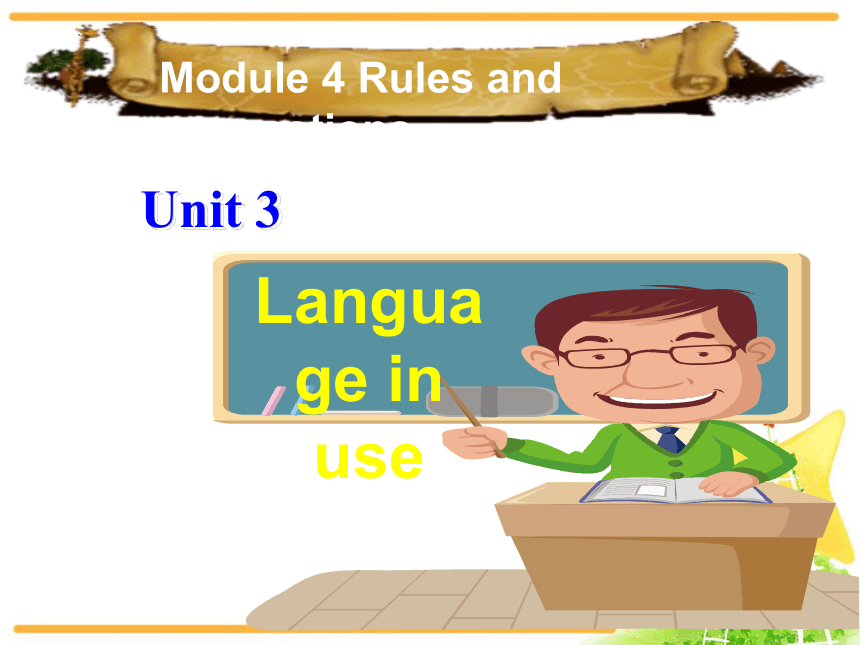(
课件网) Unit 3 Language in use Module 4 Rules and suggestions 1. To summarise and consolidate the use of modal verbs 2. To know more rules of eco-tourism Objectives 情态动词 Are you familiar with these sentences They are all from this module. Observe 1. You must be careful of falling stones. 2. You mustn’t walk too close to the edge of the hill path because you might fall and hurt yourselves. 3. You should always wear proper clothes. 4. Bears might think our rubbish is food. 5. — Can we go rock climbing — No, you can’t. 6. You mustn’t go off on your own. 7. You may need some water. 8. We should hang the food in a tree tonight. 9. They can smell food from a long way away. 10. Bears might think our rubbish is food. 11.No one can run faster in the forest than a bear. 12. You mustn’t make any sudden moves or make a sound. And above all, you mustn’t run. 1. You _____ be careful of falling stones. 2. You _____ (not) walk too close to the edge of the hill path because you _____ fall and hurt yourselves. 3. You _____ always wear proper clothes. 4. Bears _____ think our rubbish is food. 5. — _____ we go rock climbing — No, you _____(not). 6. You _____ (not) go off on your own. must mustn’t might should might Can can’t mustn’t go Ready 7. You _____ need some water. 8. We _____ hang the food in a tree tonight. 9. They _____ smell food from a long way away. 10. Bears _____ think our rubbish is food. 11.No one _____ run faster in the forest than a bear. 12. You _____ (not) make any sudden moves or make a sound. And above all, you _____ (not) run. may should can might can mustn’t mustn’t 以上我们已经通过归纳总结和练习对本课的语法内容有了一定的了解, 下面就让我们根据之前练习的考察情况进一步选择讲解该语法项的重难点。 语法讲解 情态动词本身有一定的意义,但不能独立作谓语,只能与其后的动词原形一起构成谓语,表示说话人的情绪、态度或语气,用来表达建议、请求、可能或意愿等。情态动词没有人称和数的变化,情态动词后必须跟动词原形。常见的情态动词有:can, could, may, might, must, need, shall, will, should, would。 情态动词 Can you lift this heavy box (体力) Mary can speak three languages. (知识) Can you skate (技能) can, could 此时可用be able to代替。can只有一般 现在时和一般过去式; 而be able to 则有 更多的时态。 ①表示能力(体力, 知识, 技能), 常用情态 动词can和could表达。 如:I’ll not be able to come this afternoon. (一般将来时) He was able to go to the party yesterday evening in spite of the heavy rain. 当表示“经过努力才得以做成功某事”时用be able to, 不能用can。如: —Can I go now —Yes, you can. / No, you can’t. —Could I come to see you tomorrow —Yes, you can. (No, I’m afraid not.) 此时可与may互换。在疑问句中还可用could, might代替,但could, might并不表示过去式,只是语气更委婉。它们不能用于肯定句和答语中。如: ②表示请求和允许。如: They’ve changed the timetable, so we can go by bus instead. This hall can hold 500 people at least. ③表示客观可能性(客观原因形成的能力)。如: Can this be true This can’ ... ...

